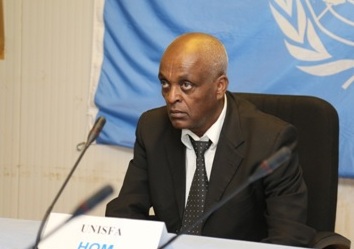UNISFA chief vows to promote dialogue on Abyei issue
February 17, 2015 (ADDIS ABABA) – The new head of the United Nations Interim Security Force for Abyei (UNISFA) pledged to encourage dialogue between Sudan and South Sudan over the disputed Abyei area.

However three years later the parties didn’t implement the agreement and a latent tensions continues to simmer in the contested with sporadic clashes between the nomadic Messeriya and Ngok Dinka farmers.
Haile Tilahun Gebremariam, “announced at a town-hall meeting in Abyei (Tuesday) that his priorities for the Mission would be to facilitate dialogue between the governments of Sudan and South Sudan and to help move the political process forward,” said a statement issued by UNISFA spokesperson Daniel Adekera.
Gebremariam further said he would encourage the Abyei Joint Oversight Committee (AJOC) to resume discussions on the 20 June agreement implementation and urge Abyei communities to refrain from hostile acts and embrace the culture of dialogue.
On 28 January 2015 United Nations secretary-general BAN Ki-moon appointed Haile Tilahun Gebremariam of Ethiopia as the Head of Mission for UNISFA
Last Monday, the chairperson of the African Union Commission (AU), Nkosazana Dlamini Zuma, said “deeply concerned” by the incidents that took place in Abyei in the past few weeks, including killings and abductions, as well as raiding of livestock in various villages.
Zuma urged the Abyei communities to desist from any action likely to heighten tension in the Area. Further She called on the governments of Sudan and South Sudan “to make renewed efforts towards the early establishment of the Abyei Police Service, as well as of the administrative bodies” in line with the 20 June deal.
The Ngok Dinka community organised a unilateral “referendum”, to determine the final status of Abyei” in October 2013. But the vote was disavowed by Khartoum and Juba and rejected by regional and international institutions.
A referendum to determine whether the region remains in Sudan or join an independent South Sudan had to be held since January 2011 but the signatories of the Comprehensive Peace Agreement failed to define who can take part in this vote.
(ST)
